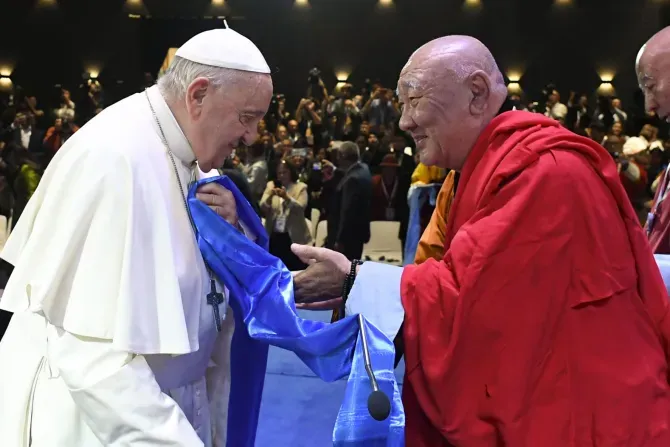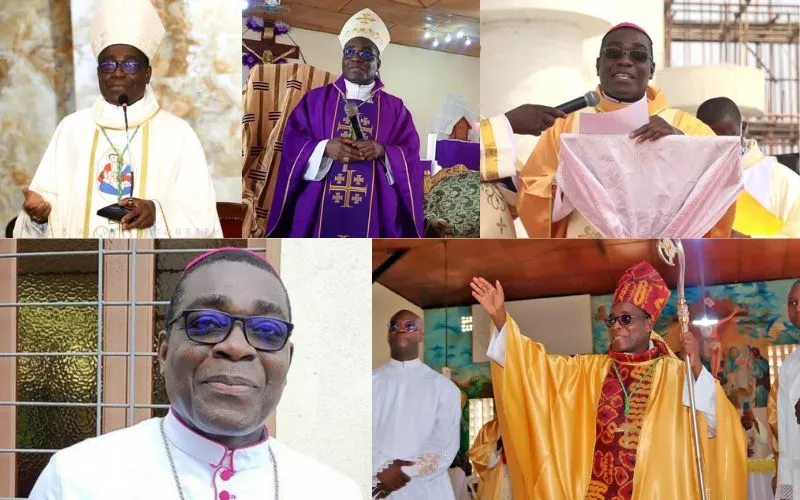“May the memory of past suffering — here I think especially of the Buddhist communities — bestow the strength needed to transform dark wounds into sources of light, senseless violence into the wisdom of life, devastating evil into constructive goodness,” Pope Francis said at the meeting.
Gusev, who represented the Russian Orthodox Church at the event, also recalled the persecution Christians experienced in Mongolia in the 20th century, particularly the torture and murder of Orthodox Father Feodor Parnyakov by Russian Gen. Baron Ungern von Sternberg in 1921.
In his speech, Pope Francis quoted another line attributed to the Buddha: “‘The wise man rejoices in giving, and by that alone does he become happy.”
The pope also cited the writings of Mahatma Gandhi on having “purity of heart” and Lutheran existentialist philosopher Soren Kierkegaard on hope.
(Story continues below)
After Buddhism, Islam and Shamanism make up about 5% of the Mongolian population who expressed a religious identity in the 2020 census.
In Mongolian shamanism, shamans enter trances to communicate and are sometimes possessed by spiritual beings. Animal sacrifice, particularly of horses, is still sometimes part of shamanistic rituals, as well as music, dance, and chanting.
D. Jargalsaikha, the president of the United Union of Shamans of Mongolia, explained that Mongolian shamans “worship the idols of the Eternal Heaven, Emperor Ghengis [Khan], ancestors, and parents.”
Shamanistic practices are also incorporated by many Buddhists in the country. The majority of Buddhists in Mongolia today are Mahayana Buddhists.
In the pope’s first speech to Mongolian government officials, the pope said that “the holistic vision of the Mongolian shamanic tradition, combined with the respect for all living beings inherited from Buddhist philosophy, can contribute significantly to the urgent and no longer deferrable efforts to protect and preserve the planet.”
Christians are a small minority in Mongolia representing 2.2% of people who hold religious beliefs in the country. Mongolia’s 1,450 Catholics make up far less than 1% of Mongolia’s 3.3 million people, but the Church has been growing with 35 baptisms in the last year.
At the interreligious event, Dambajav Choijiljav, the head of the Zuun Khuree Dashchoilin Buddhist Monastery, and Jargalsaikhan met the pope and made a speech.
Other religious representatives at the meeting included Adiyakhuu Oktyabri from the Seventh-day Adventist Church, a Morman, and a representative from the Mongolian Baha’i community.
“I would like to reassure you that the Catholic Church desires to follow this path, firmly convinced of the importance of ecumenical, interreligious, and cultural dialogue. Her faith is grounded in the eternal dialogue between God and humanity that took flesh in the person of Jesus Christ,” Pope Francis told the religious leaders.
Following the interreligious event, Pope Francis will return to Ulaabaatar’s apostolic prefecture for lunch before presiding over an afternoon Sunday Mass at Mongolia’s Steppe Arena. The 86-year-old pope will make the 11.5-hour return journey to Rome on Monday afternoon.
Courtney Mares is a Rome Correspondent for Catholic News Agency. A graduate of Harvard University, she has reported from news bureaus on three continents and was awarded the Gardner Fellowship for her work with North Korean refugees.








